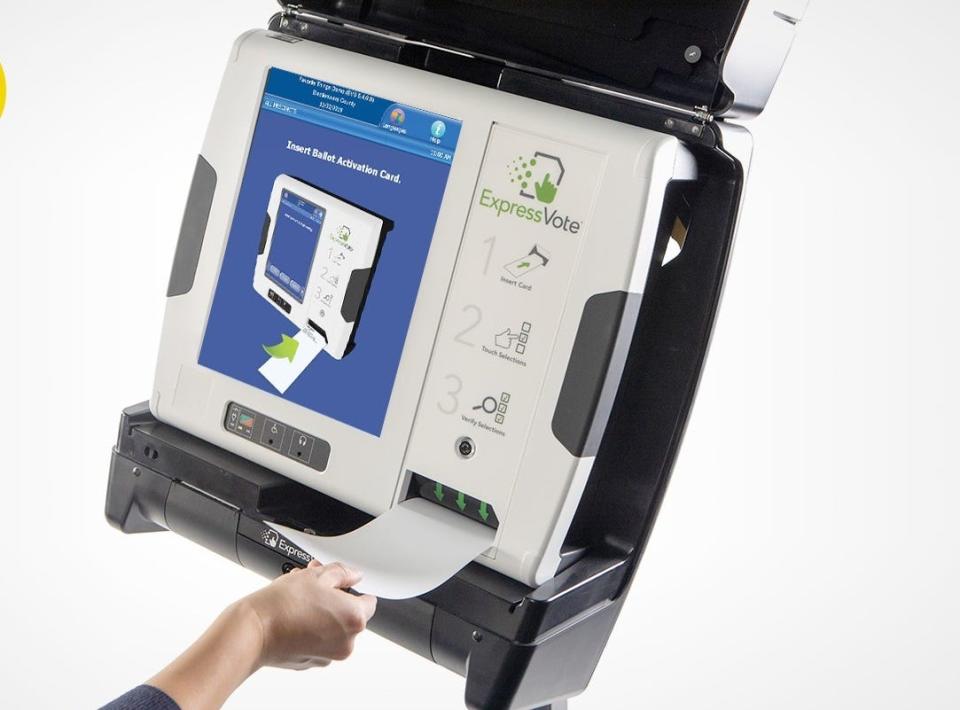Williamson County denies voting machines. Election leaders ‘disappointed,’ seek solution.
Years of debate over the reliability of electronically-marked voting machines concluded when the Williamson County Commission recently voted against purchasing the equipment local election leaders recommended.
The Voters for Election Integrity citizen group applauded last week's vote, while county election commissioners were disappointed but committed to find a solution.
“Historically, (the county commission) has always funded our needs and our requests,” said election commission Chairman Jonathan Duda. “Although we are disappointed with the vote result, we are going to go back and explore every option to work with the County Commission to find a solution to receive the funding we need to conduct elections that the citizens of Williamson County can be proud of and have confidence in.”
The vote comes two months after the commission approved extending a current contract with Election Systems & Software through late June. At that time, the county attorney questioned if the county commissioners could ultimately deny funding for the voting machines.
Frank Limpus with Tennessee Voters for Election Integrity, said the organization is "grateful that county commissioners listened to the concerns of their constituents." Repeating what group members have argued for months with county leaders, Limpus again stated that they “have grave concerns about the proven vulnerabilities” with various election devices.

What happened?
A resolution for a contract worth more than $1 million with Election Systems & Software equipment failed May 8 with 12 county commissioners voting for ESS and 11 against. One commissioner was absent. Thirteen votes were needed for approval.
The contract as presented would cost the county about $116,000 with the remaining funds coming from the state.
Earlier this year, the election commission decided to continue with ESS. Duda said ESS “was the most capable vendor to operate our elections in Williamson County.”
Critics of Williamson County election officials have expressed more uncertainty about using a device to mark a ballot — as opposed to marking the ballot by hand — than criticizing the ESS company.
However, the election commission argued the drawbacks of hand-marking ballots far outweigh any benefits.

What were the options?
Voting machines largely work three ways: hand-marked paper ballots which are counted by scanner; paper ballots marked by a device (based on voter’s choice in the booth); and direct recording electronic machines that only store votes in memory. However, fewer and fewer direct recording-type machines are being used as a paper trail is increasingly required in recent years. In fact, Tennessee law requires that by January all voting machines statewide must have a paper trail.
The Williamson County Election Commission analyzed three systems:
Paper ballots prepared by a ballot marking device and cast by the voter with a scanner, which is what the county currently uses. Estimated cost is $116,000.
Hand-marked paper ballots prepared by a voter on a ballot printed at the polling location and cast by the voter with a scanner. Estimated cost is $367,599.
A hybrid system where the voter is given the option to prepare their ballot through a ballot marking device, or prepare a hand-marked paper ballot. Both options require the vote to be cast with a scanner. Estimated cost is $591,000.
Why current Election Systems & Software was chosen
The election commission chose to continue with the current system based on various factors including an error rate of less than one percent and offering the cheapest option, according to Duda.
He said hand-marked ballots are less secure, costlier, and more susceptible to human error. Last year in Williamson County, Duda said just over 2,000 hand-marked absentee ballots were received and about 150 of those, or 7.5 percent, “had to be inspected for voter intent and transposed in order to be cast properly.”
“A vast majority of Williamson County residents are satisfied with our voting system and proud of our elections,” Duda said. “We know this because Williamson County consistently leads the State in voter turnout.”
More: Williamson County keeps voting machines. Why elected officials don't have final say
What’s next?
Duda and the election commission have stated they will “work with” the county commission to find a solution in the weeks ahead.
However, county attorney Robert Cook previously said "if the county commission fails to fund it, the election commission can go ahead and purchase them."
Tennessee law states, “If a County fails to appropriate funds sufficient to pay expenses that are reasonably necessary for the discharge of the statutorily mandated duties of its county election commission, such commission may petition the chancery court of the county in which the election commission is located to compel the appropriation of such funds.”
In this scenario, the election commission would essentially be going to court to get the county commission to provide the funds.
The election commission has a meeting this month to further discuss next steps and then bring back a possible solution at the June county commission meeting.
This article originally appeared on Nashville Tennessean: Voting machines in Williamson County in limbo again after vote

